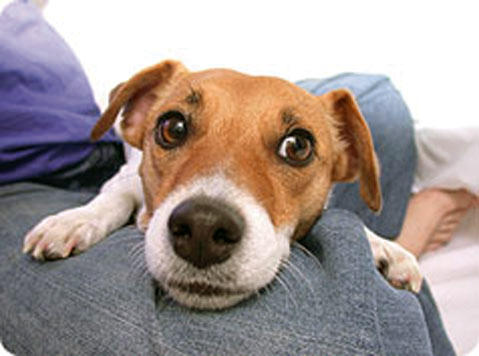Animals: Choking Hazards
Protect Your Pet from Dangerous Toys and Treats

We all love our pets and enjoy giving them toys and goodies for chewing. Most of the time, there is little risk to offering these entertaining objects, but sometimes our best intentions can backfire. Sadly, veterinary professionals often see emergencies in which pets are rushed in due to choking on toys or treats. Sometimes the obstruction can be successfully removed and the pet’s airway restored; other times it’s too late to save a pet by the time they arrive at the hospital. It is important for every pet owner to know the risks to prevent choking hazards in the first place:
Animal Bones: Chicken and lamb bones splinter and can penetrate the back of the throat, the esophagus, or gastrointestinal tract, creating holes that leak fluids and cause infection. Larger, harder bones can slip backward in a dog’s mouth and obstruct the airway or become lodged in the dog’s esophagus or anywhere in the gastrointestinal tract. They can also fracture teeth, causing the animal a lot of pain and creating the need for expensive dental procedures.
Toy Size Matters: Some toys are made for small dogs or cats; these toys can easily cause choking in a medium- or large-breed dog. If you have both a large dog and small dog, choose only larger dog toys for both. Racket balls and the like become slimy from a dog’s saliva and can easily slip into the back of the throat.
Chew Toys Can Pose a Threat: Rawhides and cow hooves are highly desirable chew toys, but there are a couple of issues of which to be aware. Some dogs will chew the knotted ends off the raw hides, which can quickly become life-threatening airway obstructions. Cow hooves can break into slippery pieces — just the right size for getting stuck in the airway or esophagus.
Danger for Felines: Cats are less likely to choke on toys, but they are known for chewing on strings and ribbons, which can pose a hazard. Because of their raspy tongues, the strings get caught around the base of their tongues while the rest of the string passes down the gastrointestinal tract and act like a saw on the delicate tissue. Cats can also chew on plant material that can travel above the soft palate and cause choking and gagging.
In addition to preventing possible choking hazards, make sure you know the location of the closest veterinary hospital to your home, dog park, beach, walking locale, etc. Be sure to carry phone numbers and addresses of both day and after-hours emergency hospitals.



